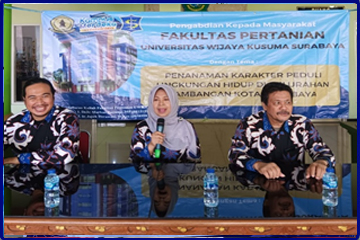PENANAMAN KARAKTER PEDULI LINGKUNGAN HIDUP DI KOTA SURABAYA
DOI:
https://doi.org/10.53067/ijecsed.v4i1.146Keywords:
Empowerment, Character Education, Environment, Pemberdayaan, Pendidikan Karakter, Lingkungan HidupAbstract
Environmental problems are a crucial issue faced by major cities in Indonesia, including Surabaya, due to high urbanization and excessive human activities that cause air, water, and soil pollution. Efforts to overcome this problem require an active role of the community in protecting and preserving the environment, with one effective way is to instill the character of caring for the environment from an early age to city residents. Environmental care character education aims to form individuals who not only have knowledge about the importance of the environment, but also have attitudes and behaviors that support environmental conservation. The city of Surabaya, as a big city, is responsible for being an example in the application of this education. This community service program is designed to provide education and training to Surabaya residents on the importance of protecting the environment, involving various elements of society such as school students, parents, and local communities. Through a participatory approach, it is expected that Surabaya residents will become more aware and responsible for their surroundings. The program focuses not only on theory but also real practice such as recycling programs, tree planting, and plastic use reduction campaigns. Through this program, it is hoped that a new generation will be formed that is more concerned and responsible for the environment, making Surabaya a model city in character education caring for the environment. The implementation in Jambangan Village using PRRA and RRA community participation methods ensures that the process runs synergistically between universities, government, and the community. The results show increased public awareness and participation in environmental conservation, with noticeable changes in behavior and increased participation in environmental activities. Challenges such as limited resources and the need for program expansion still exist, but continuous support from the government and the private sector is expected to ensure the sustainability and effectiveness of this program. Overall, this program has a significant positive impact and can be a model for other cities in Indonesia in an effort to preserve the environment and build the character of people who care about the environment
Downloads
References
Ismail MJ. Menjaga Kebersihan Di Sekolah. Guru Tua J Pendidik dan Pembelajaran. 2021;4(1):59–68.
Eka KI, Studi P, Universitas L, Purwokerto M. Implementasi pendidikan lingkungan dan dampak sikap peduli lingkungan siswa pada sekolah adiwiyata. 2020;5(2):650–7.
Rahayu I, Suwarna AI, Wahyudi E, Jamin FS, Barat US, Kaltara U, et al. Pendidikan Lingkungan Hidup dengan Membentuk Kesadaran Lingkungan dan Tanggung Jawab Sosial di Kalangan Pelajar. 2024;2(2):101–10.
Rokhmah U., Munir M. Implementasi Budaya Sekolah Berwawasan Lingkungan Dalam Membentuk Karakter Peduli Lingkungan Siswa Sekolah Dasar. Muallimuna J madrasah ibtidaiyah. 2021;7(1):63–77.
Carol T, Tompodung G, Badriyah S, Aidi MN, Pusat J. Efektivitas Program Adiwiyata Terhadap Perilaku Ramah Lingkungan Warga Sekolah Di Kota Depok. Jurnal Pengelolaan Sumberdaya Alam dan Lingkung. 2018;8(2):170–7.

Downloads
Published
How to Cite
Issue
Section
License
Copyright (c) 2024 Markus Patiung, Ristani Widya Inti, Koesriwulandari, Nugrahini Susantinah Wisnujati, Putri Kalifatun Syaiful

This work is licensed under a Creative Commons Attribution-NonCommercial-ShareAlike 4.0 International License.












